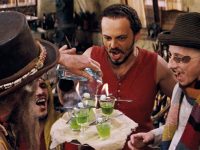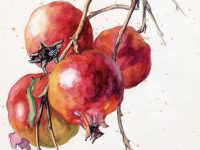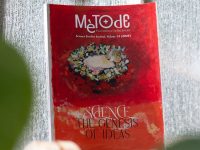
Illustration: Anna Sanchis
Edvard Grieg, the greatest exponent of Norwegian musical nationalism, always had Beethoven’s sonatas close by. They always accompanied him in his retreat in Troldhaugen. They were always with him as he sat at the piano, composing and composing. He and the sonatas were one and the same. He sat on top of them to reach the keyboard: he was only 1.52 metres tall… Apparently, the scores were just the right thickness. A great musician, Beethoven.
We have no idea how the work we are editing will be used. As a child, I was introduced to travel literature by a work entitled The great horn spoon, by the American adventurer Eugene Wright. I never knew who he was. Of course, he certainly did not know who I was. I often meet people who mention a book or an article of mine that clearly had a great impact on them. The reasons for their declared enthusiasm almost always baffle me. In layman’s terms, they act out the parable of the sower: where do the seeds we scatter at random go? Some of my writing must be fitting a wobbly table, the way Beethoven’s sonatas raised Grieg’s chair. These are very convenient uses.
They are humbling, too. A successful sonnet will immortalise the poet, but no blacksmith is be remembered for his wrought ironwork. We overvalue published culture. If you have published, the encyclopaedias mention you. Joan Fuster suddenly became interested in ecology when he received Natura, ús o abús? (1976). The kind, sardonic condescension with which he welcomed my verbal arguments changed to admiring respect when I published them. In the past, when editors filtered so much, the respect for print was understandable, but today it is no longer a guarantee. Yet it continues to impress and infatuate. We authors are not as important as that. Or no more than so many other people who do remarkable things but leave no signature on them. The doctors who save your life, the surgeons who stitch up your wounds, or the mechanic who fixes a breakdown in your car. Most do not sign the work they do. There are countless portentous anonymous works, as well as a considerable number of botched jobs that are signed. A great imbalance.
The world is a choral work by an unknown author. Unrecognised, to say the least. Fields, roads, towns, countless objects, services of all kinds… Art and knowledge are both admirable and traceable. But where is the traceability of the rest of the world? Signing is a modern custom. We do not know who painted Altamira, who built the cathedrals or invented the wheel. To whom do we owe agriculture? We do not know who built the first sail, who invented the compass, who erected the first arch or vault. Who wrote the Homilies d’Organyà? And the books of the Bible? Someone would have to discover alcoholic fermentation or how to make bread. Not to mention fire. Together we have made everything, but we only know the names of a few makers. Now that we are signing and collecting royalties (for minor things, to put it in perspective), we should feel gratitude and respect for so many predecessors who built the world anonymously.
«There are countless portentous anonymous works, as well as a considerable number of botched jobs that are signed. A great imbalance»
Today stupid signatures abound. Millions of identifiable, expendable authors clutter the web. What is truly important is not to sign, but to do relevant things well. Take the photovoltaic revolution, for example. The French physicist Alexandre Becquerel discovered the photovoltaic effect in 1839; we know this because he published his research. We also know that the American Charles Fritts built the first solar cell, made of gold and selenium, in 1883. In 1954 came the first photovoltaic cell of acceptable performance, made of silicon, built at Bell Laboratories by a team that we no longer remember. Nor do we know which technicians have been constantly improving the photovoltaic panels that have been manufactured wholesale for a number of years. The photovoltaic revolution is a collective and anonymous task, along the lines of so many other great achievements of humankind. We should be grateful for this. And, above all, we should be humble and efficient accomplices: we chorally need renewables more than Grieg needed Beethoven’s sonatas.





